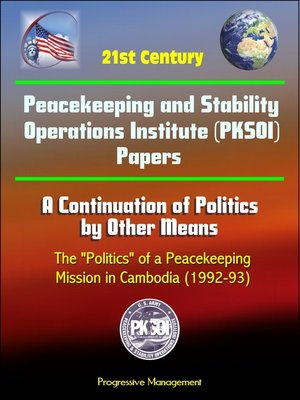21st Century Peacekeeping and Stability Operations Institute (PKSOI) Papers--A Continuation of Politics by Other Means
ebook ∣ The "Politics" of a Peacekeeping Mission in Cambodia (1992-93)
By Progressive Management

Sign up to save your library
With an OverDrive account, you can save your favorite libraries for at-a-glance information about availability. Find out more about OverDrive accounts.
Find this title in Libby, the library reading app by OverDrive.



Search for a digital library with this title
Title found at these libraries:
| Loading... |
Since the establishment of the United Nations (UN) in 1945, 63 peacekeeping missions have been authorized by UN mandate. Some fell directly under the UN, and others were conducted under UN authorization by lead nations. The mandates have been justified under UN Charter VI, "Pacific Settlement of Disputes," and Chapter VII, "Action with Respect to Threats to the Peace, Breaches of the Peace, and Acts of Aggression."1 Regardless of intent, the UN record in peacekeeping is one of mixed success. Numerous reasons for the failed or less than successful peacekeeping missions are offered: vague or weak mandates, conflicting objectives, ambiguous rules of engagement (ROE), and unanticipated spoilers rank high among these. This paper uses the UN Cambodian peacekeeping mission of 1992-93, considered a great success by many, to examine the complexities involved in UN peacekeeping missions and to illustrate the primacy of the political context in determining success.Peacekeeping is a civil-military operation on the UN's Spectrum of Peace and Security Activities. Whereas conflict prevention uses structural or diplomatic measures to preclude conflict within or among states, peacemaking applies measures, usually diplomatic, to bring hostile parties to fruitful negotiations. Peacekeeping missions aim to prevent the resumption of fighting by guaranteeing security for the parties of the conflict until a foundation for resolving the conflict and a sustainable peace is laid. It generally involves the separation of forces, the laying down of arms by the belligerents, the reintegration of the belligerents into society, and the facilitation of the resumption of a degree of normalcy within society. Recent conflicts with their almost wanton disregard of human rights and mistreatment of civilians have made the protection of civilians a key component of the peace process. Peace enforcement is an operation where coercive measures, including the use of threat of military force, are used to restore international peace and security. Peace-building, the last component of the operational spectrum, uses a range of measures to reduce the risk of a relapse into conflict and is a long-term process focused on a sustainable peace. While these operations are distinct in doctrine, the measures and actions used in application and issues confronted often appear similar. Nonetheless, the purpose of each operation is distinct, even as all seek to create peace and stability.While peacekeeping has evolved, it remains distinct and useful as an operational concept along the spectrum of peace and security activities. However, it is not without its conceptual liabilities. Historically and today, peacekeeping operations adhere to three basic principles: (1) consent of the parties, (2) impartiality, and (3) nonuse of force except in self-defense— and more recently the defense of the mandate. The first predicates the mission and its success on the consent of the main parties to the conflict and their commitment to a political process and support of the UN force. The second argues that retaining consent is based on implementing the mandate without favor or prejudice to any party. The last principle has evolved from an absolute policy of no use of force except in self-defense to a more realistic reflection of the authorization of the use of force to deter attempts to undermine the peace process with force and to protect civilians. The Cambodian experience reveals how these liabilities affect the progress of peace.The UN peacekeeping mission in Cambodia between 1992 and 1993 (the UN Transitional Authority in Cambodia [UNTAC]) is an excellent precursor of the growing complexity of 21st century peacekeeping. While it has been studied...






